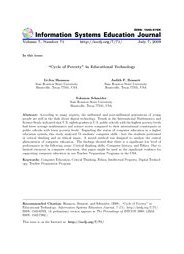Volume 7
Volume 7, Number 71 |
July 7, 2009 |
Abstract: According to many experts, the millennial and post-millennial generations of young people are still in the dark about digital technology. Trends in the International Mathematics and Science Study indicated that U.S. eighth-graders in U.S. public schools with the highest poverty levels had lower average mathematics and science scores compared to their international counterparts in public schools with lower poverty levels. Regarding the status of computer education in a higher education system, this study analyzed 74 students’ computer skills - how the students performed in critical thinking and on ethical issues. A mixed method was designed to analyze the central phenomenon of computer education. The findings showed that there is a significant low level of performance in the following areas: Critical thinking skills, Computer literacy, and Ethics. Due to limited resources in computer education, this paper might be used as the significant evidence for supporting computer education in our Teacher Preparation Programs in the USA.
Keywords: Computer Education, Critical Thinking, Ethics, Intellectual Property, Digital Technology, Teacher Preparation Program
Download this issue: ISEDJ.7(71).Shannon.pdf (Adobe PDF, 12 pages, 616 K bytes)
Preview the contents: Shannon.j.txt (ASCII txt, 35 K bytes)
Recommended Citation: Shannon, Bennett, and Schneider (2009). “Cycle of Poverty” in Educational Technology. Information Systems Education Journal, 7 (71). http://isedj.org/7/71/. ISSN: 1545-679X. (A preliminary version appears in The Proceedings of ISECON 2008: §2552. ISSN: 1542-7382.)
